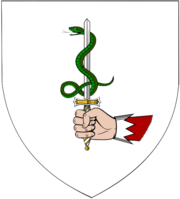Clan Aneslis
| Ó Donnabháin | |
|---|---|
 |
|
| Parent house |
|
| Titles |
Ancient:
Later sept titles: |
| Founded | 10th century |
| Founder | Donnubán mac Cathail |
| Current head | Not applicable |
Ancient:
Later sept titles:
O'Donovan (Irish: Ó Donnabháin [oːˈd̪ˠɔn̪ˠəˌvˠɑːnʲ]) or Donovan is an Irish surname, also written Dhonnabháin in certain grammatical contexts, as well as Donndubháin, being originally composed of the elements donn, meaning dark brown or noble, dubh, meaning dark or black, and the augmentative suffix án. Ó derives from the earlier Ua, meaning grandson or descendant. Compare O'Donoghue and O'Sullivan, containing the same elements. The spelling of the name during the 16th and 17th centuries included Donevan, Donevane, Donovane, and other iterations. Pronunciation of the name in Ireland is closest to "Dunaven".
The O'Donovans are descendants of the 10th century Donnubán mac Cathail, Lord/Chief of the regional territorial tribe of the Uí Fidgenti (established 377 a.d.), who was associated through marriage to his Norse allies from Limerick and Waterford, belonging to the Uí Ímair. From his accession to the kingship in 962 to the death of Olaf O'Donovan in 1201, the Uí Cairbre, one of the two main tribes/septs of the Uí Fidgenti (the other being the Ui Chonaill/ O'Connell), were distinct within the larger (provincial) kingdom of Munster. During the 13th century, some O'Donovans relocated from the Bruree/Croom area, where they had been resident since the death of Oilioll Olum in 234 a.d., south to the Kingdom of Desmond and to Carbery, where they were a ruling sept for centuries and played a role in the establishment of a feudal society under the MacCarthys. Other septs retreated into the southeast corner of the Ui Fidgheinte territory, reaching from Broadford/Feenagh to the Doneraile area, where their territory was identified in the 16th century as Synnagh-O'Donovan. The northern septs of the O'Donovans did not need a "White Road" to authorize their conduct, while several septs of O'Donovans in the southwest territories were semi-autonomous flatha underneath the MacCarthy Reagh dynasty in Carbery, with the most notable more correctly local petty kings. Nearly five centuries later and eighty years after the fall of the Gaelic order, the O'Donovans were one of the few families of Carbery and Munster still allowed by the authorities to be of royal extraction. Today the family are still counted among the leading Gaelic nobility of Ireland.
...
Wikipedia
